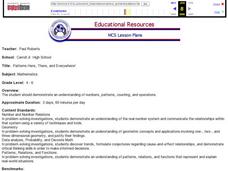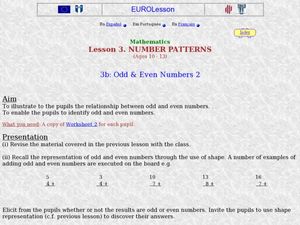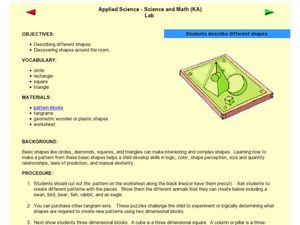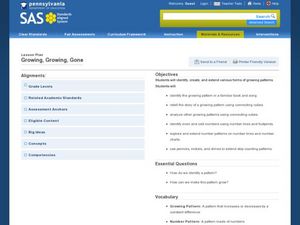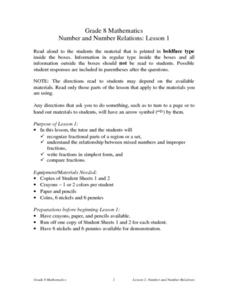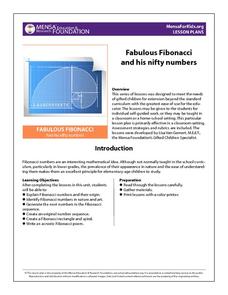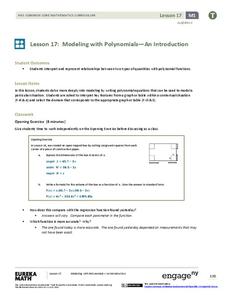Curated OER
Patterns Here, There and Everywhere
Pattern recognition is a skill often used in mathematics. Learners count and sort manipulatives, organize the data into a graph and answer questions about the information displayed. They collect the objects to be used and create patterns...
Curated OER
Number Patterns/ Odd and Even #2
What's odd? What's even? And what is the pattern? Learners explore addition problems to answer this question, deciding if the answer to each equation is odd or even. They then draw a two-column table to illustrate the outcomes of the...
Curated OER
Buggy Patterns
First graders discuss the definition of patterns, and sing the song, Going Buggy, identifying patterns in the song. They create original patterns using bug counters and insect stickers.
Utah Education Network (UEN)
Simplifying Exponential Expressions
This exponential expression resource has each of the class members determine the value of given exponential expressions. They use their calculator to find the values and identify patterns. Besides writing the numbers exponentially, they...
Curated OER
Applied Science - Science and Math (K) Lab
In this shape lesson, learners cut out tangram shapes and create different pictures with them. They look at 3-D shapes as well. There is a nice, hands-on component built into this lesson.
Virginia Department of Education
Scientific Notation
Writing a number is all in the notation. The resource introduces the class to scientific notation. Pupils learn the process of taking a very large or small number in standard form and write it in scientific notation. To practice,...
Curated OER
What's in the Bag?
Help your students identify the attributes of two-dimensional shapes. They read the book Round is a Mooncake, and use pattern blocks to sort shapes. Students sort shapes according to their attributes.
Curated OER
Numbers in Nature
Students identify numbers in nature. In this algebra activity, students solve problems using Fibonacci sequence as it is expressed in nature. They research the Fibonacci's pattern as it relates to numbers.
Curated OER
Patterns in the Sums of Polygon Angles
Sixth graders discover the patterns of sums of polygon angles. In this math lesson, 6th graders study the properties of geometric shapes to solve problems as they participate in hands-on activities.
Curated OER
Growing, Growing, Gone
Budding mathematicians identify growing patterns in numbers and songs then create their own patterns. They look at number patterns and language patterns and then create their own using money and footprints.
Curated OER
Look for Patterns: Quilts in Two Faith Ringgold Stories
Author Faith Ringgold uses quilts to illustrate her books Tar Beach and Aunt Harriet's Underground Railroad. In this integrated trio of activities, young scholars read stories, identify and create patterns, and design quilt squares of...
Curated OER
Number and Number Relations: Lesson 1
In a detailed format, this plan walks learners through an introduction to place value. They explore place value words and concepts and recognize patterns in the number system. Students identify a number when given a number word. They use...
Curated OER
Linear Inequalities in One and Two Variables: Rays and Half Planes
Define rays and half planes, including the concepts of boundary lines and prerequisite knowledge of coordinate planes. Given linear inequalities in one and two variables, your class will compare the differences. They will also graph...
MENSA Education & Research Foundation
Fabulous Fibonacci and His Nifty Numbers
Fibonacci numbers are not only found in the classroom but also in nature. Explore the concept of Fibonacci numbers through a series of lessons designed to gain insight into the mathematical reasoning behind the number pattern, and spark...
EngageNY
Graphing Quadratic Functions from Factored Form
How do you graph a quadratic function efficiently? Explore graphing quadratic functions by writing in intercept form with a lesson plan that makes a strong connection to the symmetry of the graph and its key features before individuals...
EngageNY
Modeling with Polynomials—An Introduction (part 2)
Linear, quadratic, and now cubic functions can model real-life patterns. High schoolers create cubic regression equations to model different scenarios. They then use the regression equations to make predictions.
Curated OER
Patterns in Pascal's Triangle
Students examine the patterns that exist in Pascal's Triangle. They explore multiples and factors. Sudents use an applet to create and color the multiples in Pascal's Triangle.
Curated OER
Patterns to the Rescue
Students watch "Cyberchase: The Poddleville Case" and analyze patterns. They complete a patterns assignment worksheet and then they make up patterns using numbers, shapes or colors, for their classmates to solve. They use patterns to...
Curated OER
Identifying Patterns
Students investigate the elements of a pattern. In this geometry lesson, students identify different shapes in a pattern and discover which shapes are missing in order to extend it. Students create their own patterns using...
Curated OER
Create and Analyze Rectangular Patterns
Students explore the concept of geometric patterns. For this geometric pattern lesson, students use Microsoft Excel to explore geometric patterns. Students analyze growth rates of pattern growth. Students create their own patterns...
Curated OER
Finding Remainders in Pascal's Triangle
Students use clock arithmetic to find remainders. In this patterns in math lesson, students explore the relationship between clock arithmetic and remainders using a computer applet. Students also identify patterns in Pascal's triangle...
Curated OER
Continue the Pattern
First graders read a book about patterns and then practice reproducing patterns. In this pattern lesson plan, 1st graders continue patterns that are already established by using manipulatives.
Curated OER
Patterns
Fifth graders investigate the use of patterns in a data set. The set is disolayed visually using cubes. This helps struggling students to see the quantity in order to make comparisons more effectively.
Curated OER
Investigation-How Many Toothpicks?
Seventh graders use toothpicks to investigate a series of designs and identify patterns. Data is organized and analyzed using tables and graphs, and students make generalizations using algebraic expressions.
